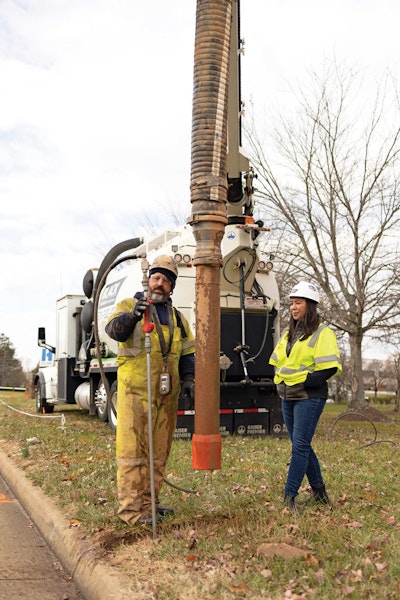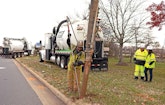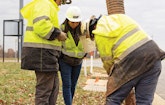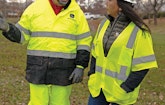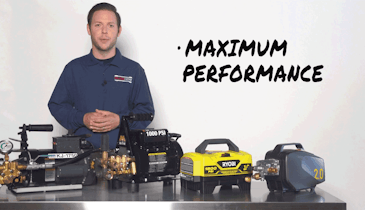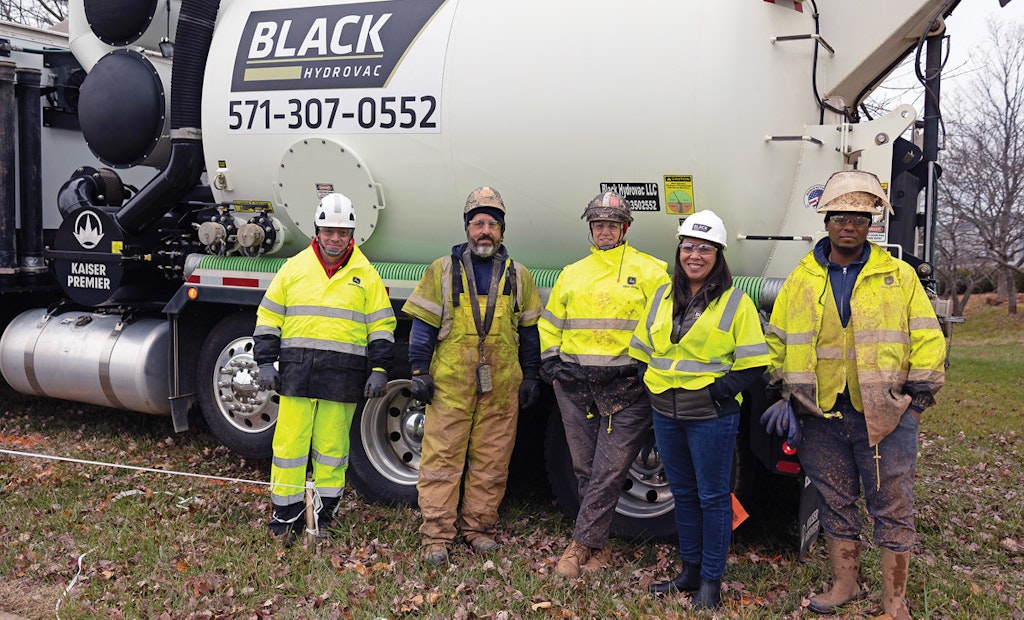
The crew at Black Hydrovac includes (from left) operator Michael Stayert, field manager Pete Wright, operator Annamarie Fagnani, owner Kristy Black and operator Lawrence Rechey.
Interested in Municipal/Industrial?
Get Municipal/Industrial articles, news and videos right in your inbox! Sign up now.
Municipal/Industrial + Get AlertsWhen you’re born with the entrepreneurial bug, you find a way to make your dream a reality. Take Kristy Black, owner of Black Hydrovac in Hamilton, Virginia, who opened her business in November 2020.
“I am learning so much,” Black says. “We are very excited to be part of the industry and are doing well. There certainly was no guarantee of success.”
The good news is that Black Hydrovac is well into its second year and still growing. The company employs eight people and is in the process of hiring another person. “It is difficult to find people right now,” Black says, acknowledging the chronic workforce shortage issue all trades are experiencing. However, she says being a startup company has not proved to be a hiring handicap. It might even be an advantage.
“It takes the right kind of person to want to be part of a startup, but it’s also a great opportunity for them. My employees are building this business. We’re so dependent on them. Everything they do directly impacts the short- and long-term success of the company. We have been able to sell our story to people we hire.”
In the end, persuading potential hires to climb aboard a young and growing company has not been daunting for Black. “I’ve not had an especially hard time getting people to join us. And, of course, there never is a shortage of people who don’t like their current jobs.”
Finding opportunities
Though Black has no construction industry background herself, she is familiar with it, and her entrepreneurial spirit and a degree in business management from Georgia Tech help her in her current endeavor. Her husband Adam is in program management, building data centers, and his family has been involved in the construction industry for generations. Yet Adam Black plays no role in Black Hydrovac, she says. “We talk about things, but I run the company.”
Black and her husband have “dabbled” in small business for years while she worked in the nonprofit sector. “Mostly we played around with ideas. Starting a business has always been a desire of mine. I’ve long been on the lookout for the right opportunity.”
That opportunity came in northern Virginia, where she and her husband moved three years ago. She began looking at the vacuum excavation industry and says “the newness of the technology appealed to me. I’m finding that a lot of people are still learning about this technology. I’ll go on a job site and meet people who have never before seen a hydrovac truck work.”
She opted to start a vac company after regularly hearing that there was a local need for it. “There certainly are some other companies in our area, but the feedback I got was there weren’t enough of them. Many of those working here were coming in from out of town because people were having difficulty scheduling vac trucks for jobs.”
The company began service with two secondhand VACMASTERS 4000 Series air vac trucks with 800-gallon debris tanks. Then in the course of the first year, Black also put three Kaiser Premier hydrovac trucks into service, rigs with 13-yard debris tanks and up to 1,600 gallons of water capacity.
Other vac companies have since entered the DC metro market — “supply and demand” — but clients keep finding new applications for vac tech.
“When people in the construction industry I talk to learn more about the technology you can see the gears start to turn in their minds,” Black says. “They’re thinking, ‘There’s other stuff to which we can apply this technology.’ There are many new applications in our market, so demand for our services has grown.”
Emerging technology
She cites the continuing need for companies to promote safety on excavation jobs, with many executives turning to vacuum digging as a safer recourse. Vac trucks are almost de rigueur for utility location, for example. “I know vac work is well established in some sectors of the industry, but some general construction contractors still are unfamiliar with it. I’m enjoying being part of a still-emerging technology.”
The company is still emerging, too. Its first client was a site developer and Black Hydrovac still principally serves general construction contractors. Generally, the jobs are what Black describes as “day-to-day;” a contractor calls with vac work needing to be done soon and the jobs take only one or two days. While company trucks are being kept busy with such work, the company owner is looking for opportunities with utility contractors that might provide longer-term projects and a steadier stream of revenue.
The bulk of Black Hydrovac jobs are hydroexcavations, rather than air vac work. “The hydro side has been very busy and continues to grow, but we haven’t found the right clients for air excavation,” Black says. Sewer and storm sewer clients also are on the yet-to-find list.
One of the more satisfying potholing jobs was on what Black describes as “a federal project. The interesting thing about it was that there was so much stuff in the ground. The more we potholed, the more stuff we uncovered that the contractor didn’t know was there. We just kept uncovering surprises. It was a perfect application for the technology.”
Black usually sends out two crew members on a call, which is somewhat unusual. She does it for safety reasons, she says, the vac work often being done apart from other construction activity at a job site. “Occasionally we’ll send one person out with the truck, but only when they’re going to be working directly with other contractors on the site.”
Practice makes perfect
The owner tries to visit every job site because she says such visits are “invaluable” to her as she brings along her company. “I learn so much when I’m out in the field.”
One of Black’s first hires was an experienced operator, who helped with initial training. As the year went along, Black relied more on training support from vac equipment manufacturers. “And we also practice,” she says. “When we have opportunity, we find an open space on a job site and I’ll call up the contractor and say, ‘Hey, can we come out to a corner of the site and practice?’”
Black understands that being the new and small company in town is both a challenge and an opportunity. The 43-year-old owner says relationships are the key. “Everyone says that, I know, but it’s so true. I have a lot of cheerleaders in business in this market. When I told people I was thinking about starting a company, I received an immense amount of encouragement. ‘There’s plenty of work to go around,’ they’d say, and then help me get connected to people who might need my services.”
Which is not to say she’s succeeding on goodwill. “We do everything we can to provide top-notch service,” she adds, “with a few little twists.” One of them is the issuance of digital reports at the end of a day, summarizing work completed. “My clients really enjoy those.”
She believes entering the industry without prior experience in the field has created some advantages for her. “I am an outsider and I have to embrace that. I don’t know all the established ways of doing things in this business. I acknowledge that I don’t know how everyone else does it, but here’s what I’m going to do because it makes sense to me. We’ve found a lot of good answers that way.”
Good help
Her woman-owned business is still rare in the construction industry, but she has not found that to be a disadvantage. “The clients I’ve worked for have been incredibly welcoming. There are adverse things I might experience at some point, or maybe there are things going on right now that I don’t realize, but for the most part the women who have come before me lay the path that has made it possible for me.”
One of her vac operators is a woman, having worked in the utility locating industry previously. “She had the most amazing attitude. It was, ‘I am going to learn this and do this,’ and she has.”
Black says all of her crew members have bought into her can-do mindset. “We all realize how fragile a small business is and how important it is that we be accepted into the industry. I love seeing crew members who are coming back in after a job and hearing the challenges they faced and how they solved them. Sometimes it will be the first time they have faced a certain type of job and they figured it out on the spot.”
Black Hydrovac is still in a day-to-day state of operation, Black says, working out kinks, building out expertise, relying more on networking than marketing, settling for a five-day-a-week work schedule rather than opening itself to emergency calls and more urgent projects. The pace of growth is not tentative so much as it is deliberate.
“We’re still getting established. There is so much opportunity in this industry. D.C. is a huge market, for example, but it has its own digging permit regulations. So we want to take it slow before we jump into that market. We’re working now mostly in northern Virginia and want to grow slowly.”
Slow but sure is the plan, shedding “startup” status by taking care of today and preparing for tomorrow. “I see us continuing to add more trucks each year and starting to look at increasing our hours. But taking our time. Not getting ahead of ourselves.”
